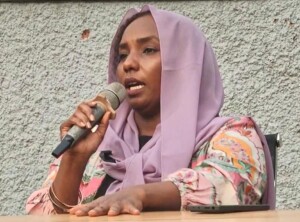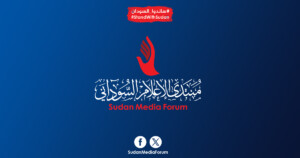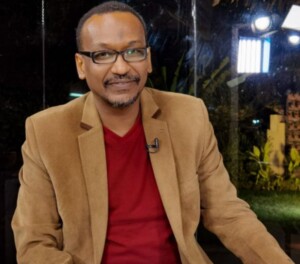Op-ed: Unwarranted Criticism on the United Nations Integrated Transition Assistance Mission in Sudan (UNITAMS)
By: Sudan Documentation Center
On Thursday, 19 May 2022, the Sudanese Ministry of Foreign Affairs issued a Press Release about its assessment of the performance of the United Nations Integrated Transition Assistance Mission in Sudan (UNITAMS). The Ministry of Foreign Affairs preceded the issue of the Press Release by organizing a Press Conference addressed by the Acting Minister of Foreign Affairs, Mr. Ali Al-Sadiq and Undersecretary, Ambassador Nader Yousef Al-Tayeb.
 Talks facilitated by UNITAMS in Khartoum on 5 May (Photo: UN)
Talks facilitated by UNITAMS in Khartoum on 5 May (Photo: UN)
By: Sudan Documentation Center
On Thursday, 19 May 2022, the Sudanese Ministry of Foreign Affairs issued a Press Release about its assessment of the performance of the United Nations Integrated Transition Assistance Mission in Sudan (UNITAMS). The Ministry of Foreign Affairs preceded the issue of the Press Release by organizing a Press Conference addressed by the Acting Minister of Foreign Affairs, Mr. Ali Al-Sadiq and Undersecretary, Ambassador Nader Yousef Al-Tayeb. In their press conference as well as press release, the representatives of the military authorities expressed their dissatisfaction with the performance of UNITAMS, and demanded that it fully carry out its mandate and fulfil its obligations, including facilitating peacebuilding, assisting in providing the requirements for a political transition, and mobilizing the necessary resources, in accordance with the four objectives contained in the UN Security Council Resolution 2524/2020.
In its press release, the Ministry of Foreign Affairs claimed that UNITAMS has not fulfilled its commitment to provide financial support in this context, and indicated that Sudan, “… since the establishment of the mission, has only received $400 million, including $200 million within “Thamarat” [Samarat] program which is a project to support poor families, and $200 million from the International Monetary Fund.” The representatives of the military authority also claimed that the mission failed to fulfill its tasks and announced that “Sudan is now in the process of evaluating UNITAMS’s work, in order to reform its course,” considering that fulfilment of UNITAMS’s obligations as stipulated in the relevant UN Security Council resolution is a prerequisite for achieving the desired benefits from its presence in Sudan. It is noticeable that the representatives of the military authority only focused on Sudan’s inability to obtain financial support and ignored the continuous and tangible contribution of UNITAMS in other vital fields, such as its efforts to promote human rights and the rule of law, overseeing issues of ceasefire, and urging the authorities to protect civilians in areas affected by armed conflicts, which are matters that were referred to in relevant UN Security Council resolutions as an integral part of UNITAMS overall mission.
The UN Security Council established UNITAMS upon request submitted by the civilian-led transitional government, headed by Dr. Abdalla Hamdok to the United Nations Secretary-General on 27 February 2020. The request, which serves pure Sudanese agenda, expressed the desire of Sudan to cooperate with the international community and to seek its support to face the political, economic and social difficulties that hinders its efforts and which it cannot overcome on its own. In response to this request, the UN Security Council adopted Resolution 2524/2020 on 3 June 2020 and defined four main goals for UNITAMS, which were reconfirmed when the mission’s mandate was re-renewed by UN Security Council’s Resolution 2579/2021 dated 3 June 2021. The four goals for UNITAMS mission are as follow:
Assisting political transition and progress towards democratic governance, protection and promotion of human rights, and sustainable peace.
Supporting peace operations and implementing future agreements.
Assist in building peace, protecting civilians and establishing the rule of law, especially in Darfur and the two areas.
Support the mobilization of economic and development assistance, and coordination of humanitarian assistance.
By analogy, the conditions of the establishment of UNITAMS are completely different from Sudan’s previous experience with other international and regional missions. The UN Security Council adopted the resolution on UNITAMS under Chapter VI of the United Nations Charter. While doing so, the Council considered a number of reports and resolutions adopted by the African Union’s Peace and Security Council. The resolution was also adopted at the request of the Government of Sudan with its expressed will and was not imposed on it. It aims at assisting the transitional authorities in their efforts to fulfill specific tasks, which represent the demands of the forces that ignited the peaceful revolution in the country, as well as the victims of armed conflicts in Sudan.
It’s worth noting that the response of the UN Security Council to the request of the civilian-led transitional government came in appreciation of the compelling economic and security conditions that Sudan is going through, and to meet the urgent needs of the country, which have been detailed in 11 aspects of the work of state agencies, within the general framework of providing aid and the necessary. They are particularly meant to address issues of peace building, improving humanitarian conditions, and providing protection for the victims of armed conflicts in Darfur and the two areas, in addition to preparing the political scene for the transition to democratic rule, including through good offices to provide support and technical assistance for the process of drafting the constitution, conducting population census and preparing for elections.
It is also noted that the outcomes of the Sudanese Foreign Ministry press conference and the way they were presented by representatives of the military authority were strongly hostile, which heralds the beginning of a confrontation or at best drawing the outlines of an upcoming fierce diplomatic battle between Sudan and the international community on renewal of the mandate of UNITAMS, which is expected to be brought forward at the UN Security Council in early June 2022.
The unjustified attack of representatives of the ruling military authority in Sudan on UNITAMS is a tactical choice intended to scare the international community and to obtain important concessions as indicated by the military authority, which insists on renegotiating the mandate and terms of UNITAMS’s work before agreeing to renew its mandate during the next few days. This position is not devoid of opportunism and aims to take advantage of the international political crisis generated by the war in Ukraine. This position does not serve Sudan’s interests but rather, it paves the way for the enemies of peace and the transition to democratic civilian rule to tighten their grip on political power in the country and take it backward.
The military authorities blame of UNITAMS for its presumed failure to perform its duties lacks credibility and misleading in presenting the problems if there are any. Blaming UNITAMS and accusing it for what the military authority perceived as failure while overlooking the most important factors that led to the shortcomings, which are purely local factors, does not provide an answer or a solution. Such attitude complicates the political scene and waste a valuable opportunity for constructive cooperation between Sudan and the international community.
As a reminder, the reasons that affected the work of UNITAMS can be summarized as follows:
1. The military coup d’état against the government of Dr. Abdallah Hamdok on 25 October 2021 is the most important obstacle faced UNITAMS, and it should also be one of the strongest reasons for its presence in the foreseeable future. This is because in the absence of cooperation with a credible civilian-led government, which is willing to make the required change towards democratic transition, it is impossible for UNITAMS to start its routine work, let alone to achieve its complex objectives, and provide the necessary services to Sudan.
2. The deep complications in the political scene in Sudan, and the multiplicity of decision-making circles due to the large number of political parties and organizations, forced UNITAMS to spend considerable time and effort to assist bringing together the Sudanese political rivals in order to form a government that enjoys the support of all the disputing parties, in cooperation with the African Union and the IGAD countries.
3. The overt and covert hostility towards UNITAMS by the counter-revolutionary forces and opponents of the transition to democratic civilian rule, as well as some political forces that support the democratic transition but refrain from cooperating with the mission for ideological reasons. The hostility towards UNITAMS reached its peak with the statements attributed to the President of the Sovereignty Council, Lieutenant-General Abdelfattah El Burhan in April 2022, when he threatened to expel the head of UNITAMS, Mr. Volker Perthes. Hostility also appeared in the harassment of some senior state officials accused of cooperation with UNITAMS, such as the criminal proceedings initiated by the General Intelligence Service against Ms. Sulaima Ishaq Sharif, Director, Unit for Combating Violence against Women, Directorate of Social Welfare, in addition to the questioning of the Public Prosecutor for participating in one of the UNITAMS’s activities. Finally, the military authority refused to renew the entry permit of the Senior United Nations Adviser in Sudan, Mrs. Rosalind Mardsen, at the end of May 2023.
In its unjustified attack on UNITAMS and accusation of failure in fulfilling its obligations, the military authority deliberately ignored the political and peaceful nature of UNITAMS mandate which stipulates that its role is to assist and support the progress made by the Sudanese transitional authorities. To make this point unambiguously clear, the UN Security Council has reiterated several times that the role of UNITAMS is to assist the Sudanese government, and therefore the mission cannot be blamed if the national authorities failed to achieve political stability and to make the necessary progress in the agreed upon areas of cooperation. In such cases, blaming the mission in light of the failure of the national authority to meet its duties in promoting peace and political stability, and in light of the fact that one component of the transitional government turned against the other and expelled it from decision-making process, is an attempt to force the mission to exit the country and to make a mockery of the international community and the Sudanese people. Such accusations aim to show a heroic role for the military for internal purpose and to thwart the aspiration of the forces supporting political change and democratic civilian rule.
The policy pursued by the current military authority since it seized power on 25 October 2021 and its tendency to reinstate supporters of the former regime in senior public positions and to cooperate with political forces that are against the transition to democratic civilian rule, renders it biased in towards the presence and work of UNITAMS. Any calls by the military authority for evaluating the performance of UNITAMS or reforming it in the absence of an internally and externally recognized, credible and reliable civilian-led transitional government, are therefore not trustworthy or feasible. Such calls do not reflect the daily reality in Sudan in an honest and faithful manner.
The call to evaluate the performance of UNITAMS and to renegotiate its mandate and method of work is a very dangerous call that cannot be bypassed without scrutiny, especially since there is evidence that confirms that the purpose of such call is not reform but rather the main goal is to put obstacles and strip UNITAMS of many powers. The call aims at restricting UNIMADS’s ability to move freely and to play its auxiliary role and assume its duties successfully. This call should be viewed with great caution and no opportunity be given to the ruling military authority to reformulate the mandate in a way that would enable it to control the work of the mission and scrape the dreams of the Sudanese people for freedom, peace, justice and liberation from the yoke of military rule.
As a reminder it should be noted that the conditions and obstacles set by the former regime during negotiation of the agreement on the deployment of the United Nations Mission in Darfur (UNAMID) in 2008, with the assistance of the African Union and its political and diplomatic support, were the direct cause of UNAMID’s failure to carry out its duties to protect civilians in Darfur. These conditions were among the main reasons that forced UNAMID’s premature exit of the region before achieving its goals, which led to the horrific deterioration in the security and humanitarian conditions that we witness today in all parts of the region.
Conclusion
Finding acceptable and consensual national solutions to Sudan’s intractable political, economic and security problems is the responsibility of the political parties and the civil society forces, provided that the state’s military and security agencies remain neutral and play their professional role as stipulated by law without interfering in the political process to direct, sabotage or stop it. The military and security agencies should also move away from total control of the economy and focus on relevant strategic industries. If the Sudanese stakeholders, including the military and security institutions, do not show the desire and ability to find national solutions to the country’s multiple problems, no other foreign party will be able to play that role, no matter how much efforts and resources they spend.
The military coup d’état against the government of Dr. Abdallah Hamdok and the consequent serious deterioration in all aspects of life in Sudan as well as the country’s growing international isolation and the reluctance of international financial institutions to provide financial resources, and freezing promised debt relief and external financial financing, are some of the strong reasons for the presence of UNITAMS. Such presence and efforts are key for the return of the transition to democratic civilian rule on its right track thus mobilizing and ensuring the flow of international development assistance and humanitarian support for Sudan. The first step in this direction is to accelerate the joint efforts of UNITAMS, the African Union and the IGAD countries, to create conditions that enable the Sudanese parties to form a credible civilian-led government which enjoys recognition and trust of the Sudanese people.
Disclaimer:
The views and opinions expressed in this article are those of the Sudan Documentation Center and do not necessarily reflect the position of Radio Dabanga.











 and then
and then